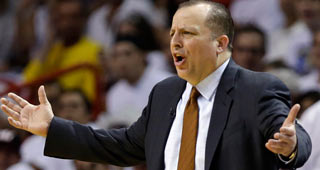The 10-21 Minnesota Timberwolves are the most disappointing team in the NBA. They turn it over a bunch, fail to utilize the three-point line, fall over themselves in tight situations, and really (seriously very badly) can’t play defense.
That last point is notable considering Tom Thibodeau is their new head coach, but maybe we should’ve seen this coming. Despite visible raw talent, this season feels more like a long runway than the takeoff most expected. The Timberwolves are the youngest team in the league and only have one player (Karl-Anthony Towns) who’s above-average at his position on both sides of the ball.
But how and why do the Timberwolves struggle to get stops, and does any explanation for their predicament extend beyond youth as a perfectly rational excuse? Thibodeau was hired to tame Minnesota’s vibrant young pups; a cure-everything-with-one-swig elixir for the troublesome tendencies and bad habits on display through a tumultuous, Sam Mitchell-led campaign in 2016.
It hasn’t gone that way. As an assistant with the Boston Celtics, Thibodeau damn near started a revolution with his approach to stifling the pick-and-roll—in short: keep the ball on one side of the floor, and drop bigs (like Kevin Garnett and Joakim Noah) back in coverage to coax long twos. After Boston won a title in 2008 and nearly won another two years later, the rest of the league followed his lead.
Thibodeau won Coach of the Year in his first season with the Chicago Bulls. That team led the league in defensive rating, and over his next four years in Chicago, the team ranked 2nd, 6th, 2nd, and 11th.
These Timberwolves are currently 26th. It’s disturbing, never more so than by the fact that they allow fewer mid-range attempts per game than every team except the Toronto Raptors. This is still the least efficient shot in basketball, and Thibodeau-coached teams are known for dictating the terms of war by forcing their opponent to attack with a dull knife.
These Timberwolves don’t do that. Instead, one third of all their opponent’s shots come within six feet of the hoop (the third highest mark in the league). Towns is a respectable inside defender (though he hunts blocks a bit too often), but Gorgui Dieng has been suspect as an anchor his entire career. Opponents shoot 51.5 percent at the basket when he’s defending it—slightly better than Enes Kanter but worse than Jahlil Okafor.
But problems stretch well beyond the opposition’s shot chart. As a group, the Wolves don't hustle back, constantly lose track of their halfcourt assignments, foul a bunch, and have poor individual defenders up and down their roster.
Let’s start with that first weakness. According to Synergy Sports, the Timberwolves rank 29th in transition defense, a number that wouldn’t surprise anyone who watched Russell Westbrook carve through them on Christmas night. It was a chainsaw versus a banana.
Some of this is due to how frequently Minnesota rushes the offensive glass. Wings like Andrew Wiggins and Shabazz Muhammad crash in from the perimeter, a big reason why the Timberwolves rank third in offensive rebound rate. That strategy comes with an obvious benefit, but Minnesota doesn’t communicate well enough for the positives to outweigh the potential for disaster.
The Timberwolves live at the free-throw line and don’t go out of their way to push the pace, but turnovers and confusion still turn their retreat into a total mess more often than not. Wide open threes are way too common.
In the halfcourt, dribble penetration cripples the Timberwolves and forces young players who are still thinking their way through defensive rotations to stumble through momentous split-second decisions. Sometimes they guess right, sometimes they don’t.
Communication is necessary in any NBA offense, and too often Minnesota’s players aren’t on the same page. Here’s one example, where Zach LaVine and Muhammad botch a switch and quickly lose track of their original assignments. It kicks off a chain reaction that eventually leads to a wide open three for Arron Afflalo.
Minnesota’s other problems are also mental. They over help, sometimes unnecessarily off really good three-point shooters. If they read the scouting report and trust each other, simple mistakes like this will become a rarity.
Thibs is an army sergeant with a scuffed megaphone stuck inside his throat. While you sleep, eat, and breathe, he’s watching film, tinkering with Minnesota’s scheme and trying to solve a problem that doesn’t feel fixable anytime soon.
The problems aren’t strategic, though. The Timberwolves have yet to grasp what their coach is preaching. That, paired with the fact that too many guys have yet to prove themselves as competent defensive players, creates a short-term quagmire. Do they trade for a veteran who can direct traffic on the floor? Or do they ride things out in bumpy fashion and wait for experience to catch up to their skill?
It’s a tough question. Either way, patience is required.



